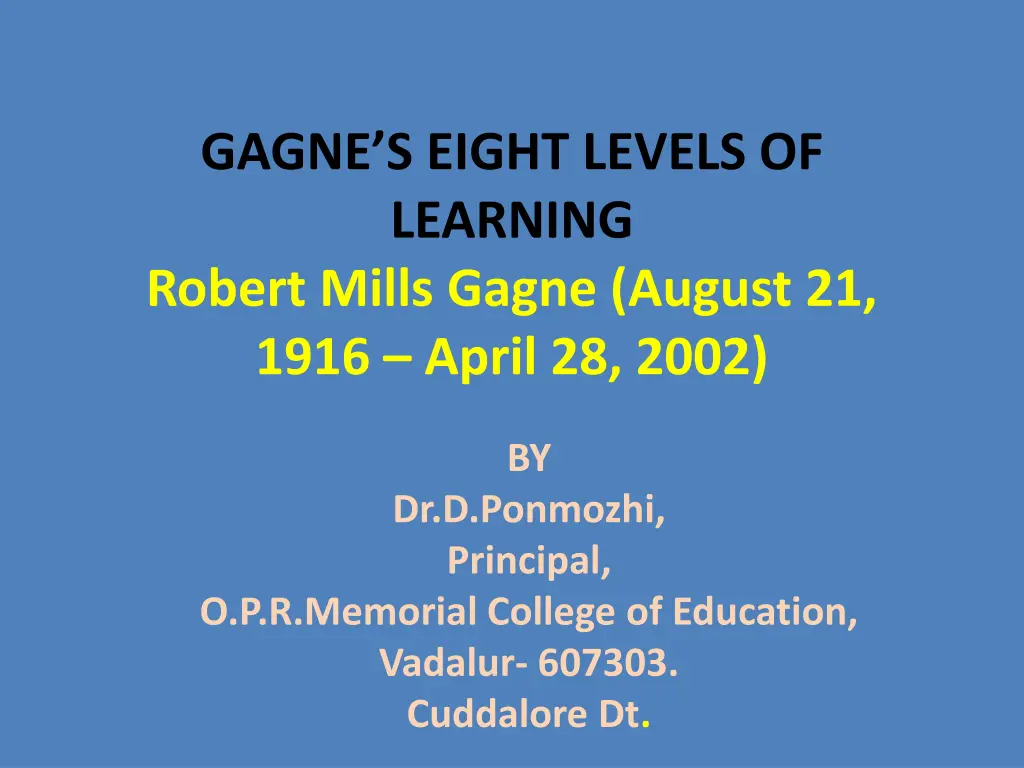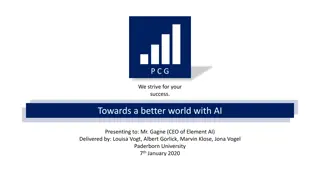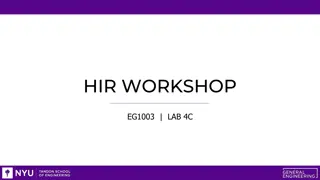
Understanding Gagne's Eight Levels of Learning by Robert Mills Gagne
Explore Gagne's concept of learning through principles, components, and events of learning, along with educational implications. Discover the 9 events/steps of instruction that contribute to effective learning outcomes as outlined by Dr. D.Ponmozhi.
Download Presentation

Please find below an Image/Link to download the presentation.
The content on the website is provided AS IS for your information and personal use only. It may not be sold, licensed, or shared on other websites without obtaining consent from the author. If you encounter any issues during the download, it is possible that the publisher has removed the file from their server.
You are allowed to download the files provided on this website for personal or commercial use, subject to the condition that they are used lawfully. All files are the property of their respective owners.
The content on the website is provided AS IS for your information and personal use only. It may not be sold, licensed, or shared on other websites without obtaining consent from the author.
E N D
Presentation Transcript
GAGNES EIGHT LEVELS OF LEARNING Robert Mills Gagne (August 21, 1916 April 28, 2002) BY Dr.D.Ponmozhi, Principal, O.P.R.Memorial College of Education, Vadalur- 607303. Cuddalore Dt.
Synopsis Author Principles of Learning Components of Learning- Conditions of Learning Events of Learning Out comes of Learning Educational implications
Principles 1. Different instruction is required for different learning outcomes. 2. Events of learning operate on the learner in ways that constitute the conditions of learning. 3. The specific operations that constitute instructional events are different for each different type of learning outcome. 4. Learning hierarchies define what intellectual skills are to be learned and a sequence of instruction.
3 COMPONENTS OF LEARNING 9 events of instruction Learning Out comes Conditions of Learning
I. 9 events / steps of instruction These 9 events of instruction take place in a semi- sequential order, and are considered external events that help learning to occur. They are: 1. Gaining Attention - Present stimulus to ensure reception of instruction 2. Informing the Learner of the Objective - The reason for learning 3. Stimulating Recall of Prior Knowledge - Building upon existing relevant knowledge 4. Presenting Information - The actual learning content is delivered
9 events / steps of instruction conti--- 5. Providing Guidance - Makes the learning as meaningful and understandable as possible 6. Eliciting Performance - The learners respond to demonstrate the extent of knowledge learnt 7. Providing Feedback - Inform learners of the degree of correctness or incorrectness of their performance, thus reinforcing learning 8. Assessing Performance - Testing the learners to ensure that the learning is stable and actualized 9. Enhancing Retention And Transfer - Being able to retain the learning over a long period of time, and being able to transfer the learning to new situations outside of the learning environment
1. Signal Learning- Learn how to respond to a signal, like Pavlov s dog (Pavlov s classical conditioned response) Usually the response is emotional 2. Stimulus(S) Response(R) Learning- Learn precise response to precise signal / stimulus Different from signal learning, signal learning leads to involuntary responses, whereas the responses in S-R learning are voluntarily controlled. 3. Psychomotor Connection Learning- Occurs when a chain of stimuli and responses are formed to follow procedures. Able to chain 2 or more stimulus-response
4. Verbal Association Learning- Use terminology in verbal chains 5. Multiple Discrimination Learning- Learn how to distinguish between similar stimuli Make different responses to each type of stimulus, even when they may be perceptually similar 6. Concept Learning- Singular / common response to an entire class of stimuli 7. Principle Learning- Viewed as a chain of two or more concepts. Learn to apply rules 8. Problem Solving- Highest learning type which lead to the discovery of higher order rules. All other types of learning must have been completed for it to be present.
III.Learning Outcomes Intellectual Skills - Having procedural knowledge, 'Knowing How' Verbal Information - Having declarative knowledge, 'Knowing That' Cognitive Strategy - Techniques for problem solving Motor Skills - Executing movements in an organized manner Attitude - Mental state that influences the choices of personal actions
Educational implications Skills should be learned one at a time Each new skill learned should build on previously acquired skills. The analysis phase must identify and describe the prerequisite lower level skills and knowledge required for an instructional objective, Lower level objectives must be mastered before higher level ones, Objectives must be stipulated in concrete behavioral terms, Positive reinforcement should be used in a repetitive manner




